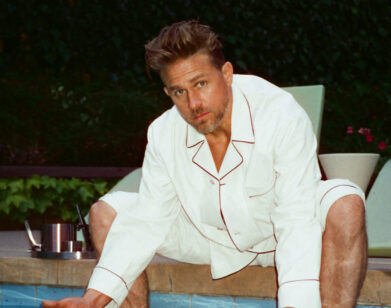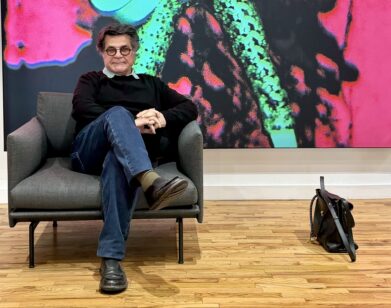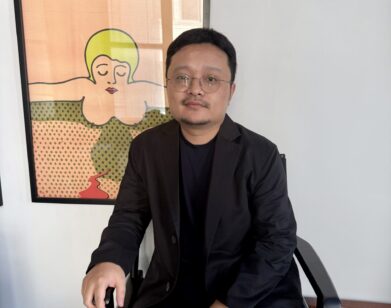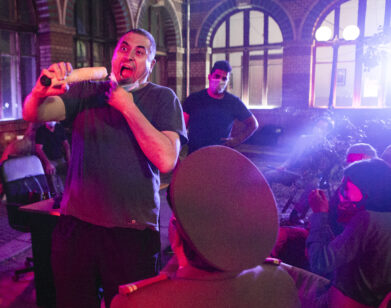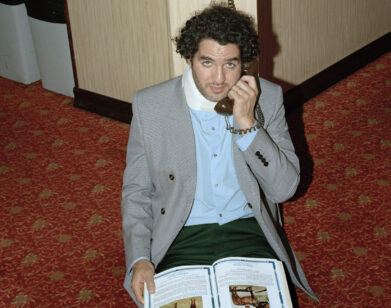Lucy Boynton
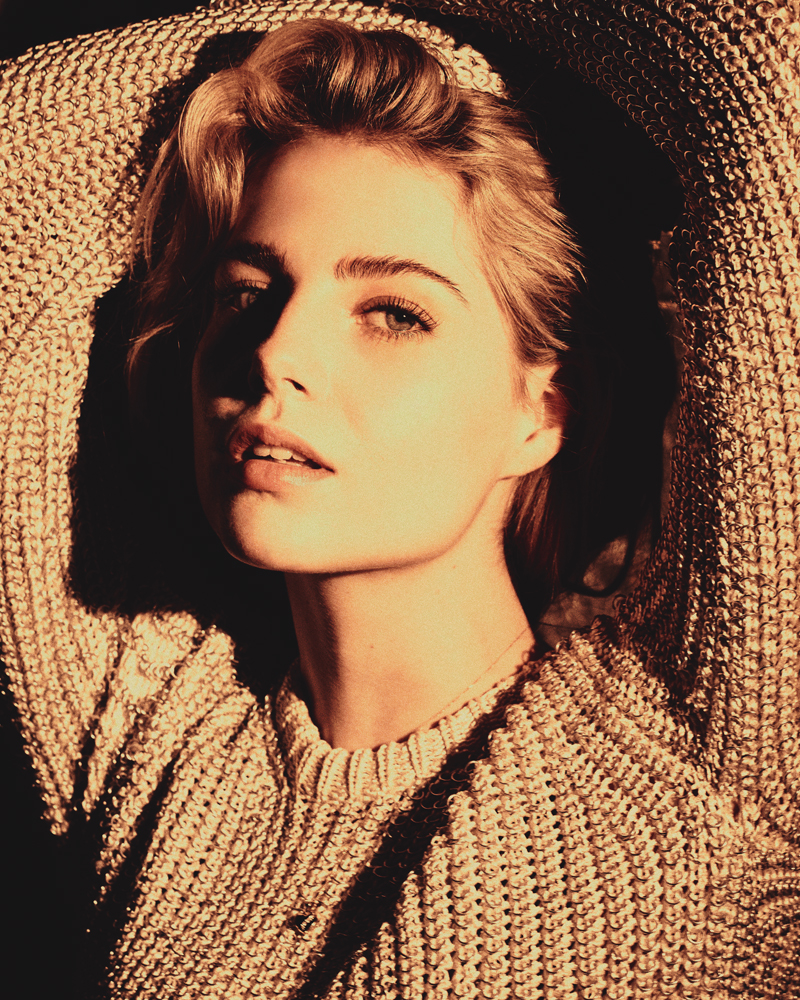
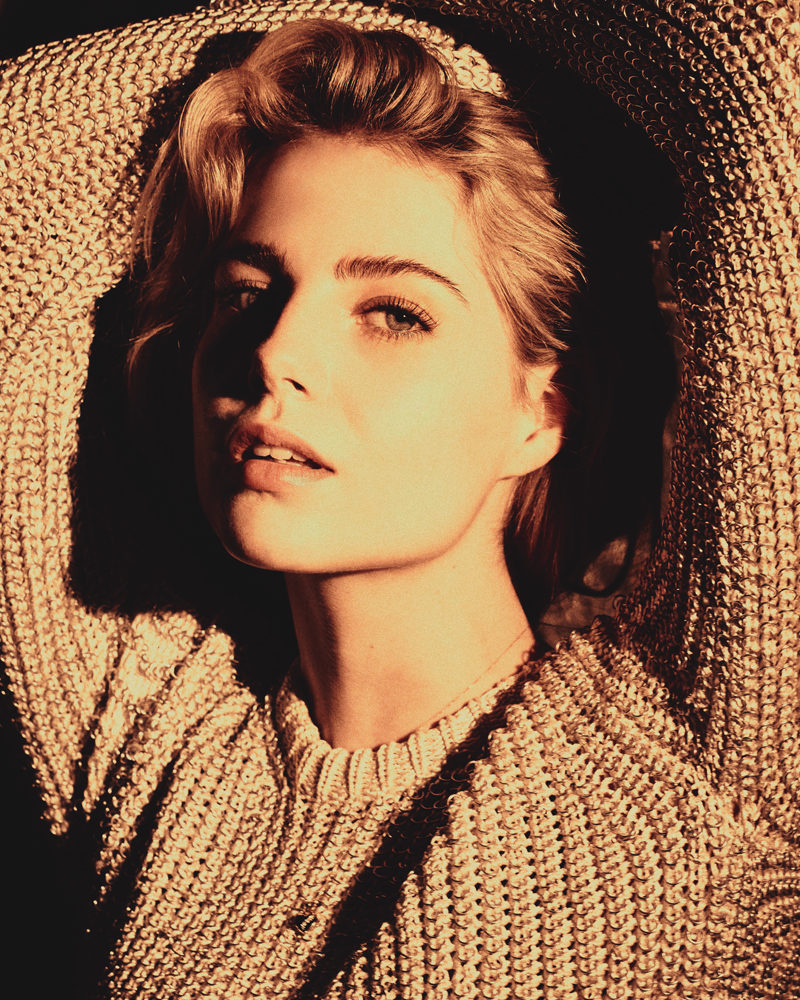
LUCY BOYNTON IN NEW YORK, MARCH 2016. SWEATER: CALVIN KLEIN COLLECTION. STYLING: ANDREW MUKAMAL. HAIR: EDWARD LAMPLEY/D+V MANAGEMENT USING TIGI HAIRCARE. MAKEUP: LUCY BURT/D+V MANAGEMENT USING CHANEL LES BEIGES. MANICURE: DAWN STERLING FOR DIOR VERNIS/MAM-NYC. SET DESIGN: ANTHONY ASARO.
Born in New York and raised in South East London, Lucy Boynton dreamed not of stardom but of working at a local animal shelter. Nevertheless, when a casting agent visited her all-girls school in South London a decade ago, she soon found herself on the set of Chris Noonan’s biopic Miss Potter, sharing the titular role with Renée Zellweger and being fitted for costumes by legendary designer Anthony Powell. In 2006, at age 12, she attended the film’s premiere in Leicester Square and gave TV interviews. Her journalist mother wrote an op-ed about the experience in The Telegraph titled “My Lucy, the Film Star.”
“I think I did well,” the now 22-year-old says modestly of her first foray into acting. The experience proved addictive. “It was no longer enough for me to enjoy watching a film; I wanted to play the roles in them. I wanted to feel all those things,” she recalls. “I remember watching that scene in My Girl where Anna Chlumsky cries at a funeral. I would cry with her and be like, ‘Yeah, I think I could do that. I could do a funeral scene.'” Boynton landed a more substantial role in Ballet Shoes (2007) alongside Emma Watson, and played Margaret Dashwood in a miniseries adaptation of Sense & Sensibility (2008). When she turned 14, at the request of the adults around her, the young actress took some time off. “I was forced to put school first, which I appreciate now, but then was very resentful about,” she admits.
She’s back with a vengeance this year, with a number of films on the horizon. Two are horror movies: The Blackcoat’s Daughter and Don’t Knock Twice. But first is John Carney’s Sing Street, a coming-of-age musical set in Ireland in the 1980s, when the economy was in decline and divorce was still illegal. Boynton plays 16-year-old Raphina, a self-proclaimed model living in a group home and the love interest of the young protagonist. “Originally, they said I was too old, but they kept calling me back, saying, ‘You can do one more take—try to look younger,’ ” she says laughing. “There’s so much to Raphina; she is the beautiful magazine girl that the main character falls in love with, but she’s actually a very dark person.” While there aren’t any funeral scenes in the film, Boynton does get a chance to showcase some tears.
EMMA BROWN: I read your mother’s article from when you were in Miss Potter.
LUCY BOYNTON: Oh god. I haven’t even read it, but people keep bringing it up to me and I’m so paranoid.
BROWN: It’s really endearing. I heard that they expanded your role in Miss Potter after you were cast.
BOYNTON: They did. Originally there were three of us playing Beatrix Potter—myself, an actress called Perdita Weeks, and then Renée Zellweger. Then the age difference between Beatrix at Perdita Weeks’ age and Renée’s age was too close with that much of a change in look, so Perdita couldn’t do it anymore. But apparently at the time she was much more interested in school, so she didn’t mind too much. Then I played Beatrix at 13 as well, so had to wear corsets and padded-everything because I still had such a child’s body.
BROWN: What was it like going back to school after Miss Potter? Did you feel like you’d already made friends your first year or were you “the film girl”?
BOYNTON: I felt liked I’d made a secure group of friends. I did Miss Potter only a few months into Year 7 [sixth grade], but I definitely made a core group of friends, so I had that. But it was hard going back. Another girl in my year had auditioned for the same role. I remember I spoke about it with my friends a bit, and everyone said I was boasting, so I immediately shut down and I never spoke about it. I’ve kind of kept that even now—except for my close friends, I don’t really discuss it. It was strange, especially because all of the projects I did when I was young, I was always the youngest on set or the only child, so I spent my formative years hanging out with 24-year-olds when I was 13. It became so much more comfortable, but then going back to school seemed a slight deflation.
BROWN: Did you have any friends who were young actors?
BOYNTON: I didn’t at the time. I do now just from working on jobs. Two of my best friends, we did a job together, Endeavour, which was three years ago. Now I’m getting more friends in the industry, which is so nice—being able to send frantic texts about how awful this audition was and exchanging advice.
BROWN: A lot of the actors I talk to who started working when they were children have one particular project where they felt they really transitioned from just playing pretend to becoming an adult actor. Was there a moment like that for you?
BOYNTON: I think Ballet Shoes was a very pivotal role for me. I was about 14 then, and it was an incredible cast: Eileen Atkins, Victoria Wood, Emilia Fox, Harriet Walters. All these incredible women. Being surrounded by them and being treated more like an adult on set really brought me out of being coddled as the child on set. That role was also one of my bigger roles—my first kind of lead role, so I had a lot more responsibility. It was exhausting, but so rewarding. I was absolutely drained going to bed at three in the morning and getting up at six again, but it was just, “I want to work this hard. I need to work this hard.” I had a gap after that where I didn’t work for a few years. I think that was very formative as well, because I’d been extremely lucky with the roles I’d had until then, and that gap made me realize how much I wanted it and how much I needed it and how lucky I was to have had those consecutive roles quite quickly.
BROWN: Did you ever think about going to drama school?
BOYNTON: I did. I auditioned for RADA when all of my friends were applying to university and choosing their future paths. I toyed with the idea of going to drama school or doing drama at university or something completely different. The only thing that turned me away from drama school was not being able to take outside jobs while you’re there; I’d have to take three years out, and as soon as I left school, I was so desperate to get straight back into filming. I’m lucky; I’ve been signed with my agent since I was 12, so I always had that strong place to go back to.
BROWN: Did she sign you after seeing you in Beatrix Potter?
BOYNTON: Yes. I think it was about to come out and she’d seen a few screenings of it and I met her and I’ve been with her ever since.
BROWN: And she was fine with you taking time off?
BOYNTON: Yeah, she’s always been incredibly supportive of what I wanted to do, especially because I was so young. She was very encouraging to put school forward, and she was actually the one saying, “Just think really hard about drama school or university” and was pushing for me to go and study something completely different.
BROWN: I know you were born in New York. Did you ever have an American accent?
BOYNTON: I was born in New York and moved to London with my family when I was five. I did have an American accent for a couple of months and then it went a way. It was such an insult to be called an “English girl.” Me and my sister used to tease each other: “You’ve got a British accent. English girl! English girl!”
BROWN: I heard that you are working on your own script, is that true?
BOYNTON: Kind of. I’ve always been really interested in writing my own stuff and I don’t want this to be the only focus I have. I’m so interested in all the other aspects of this industry – I’ve always been so interested in casting as well. I don’t plan on doing anything with it, it’s purely for my own interest, trying to advance my understanding of everything I do. Don’t expect to see it any time soon.
BROWN: Can you tell me a bit about the basics of how you got involved in Sing Street?
BOYNTON: It was one of those scripts that you read and immediately, it’s like, “I have to be in this. I can’t let anyone else play this role.” I did a few self-tapes; I was trying to look like as much of a child as I could. Then I skyped with [the writer and director] John [Carney] and flew over to Dublin about four times to meet with him and start screen testing with the boys as well. It was such a stressful process just because of how much I wanted it—the script is phenomenal and the character. So thank god he gave it to me.
BROWN: How do you try and look younger? Less makeup or more makeup?
BOYNTON: This is the thing, I don’t really know. I did way less makeup and just nothing—nothing in my hair or anything. More fresh-faced. I actually had to look older for an audition recently, so I was asking hair and makeup on my film at the moment, and she said you look younger by having very fresh, clean skin and no makeup, and older is more contour-y and all that. Words to live by. I’m constantly trying to do that for auditions, though, trying to go up and down.
BROWN: Sing Street is such a feel-good movie, and it’s rare to watch a movie like that and not feel, “This is so cheesy.”
BOYNTON: Exactly. And to have a really feel-good film that has so much substance. I love rom-coms and light films as well, but this is so rich and can be quite dark and sad and some bits are totally devastating. I ended up crying at the end [when I watched it], which is pathetic. I’d seen it, but on a very small screen without an audience, so to feel the impact of everyone enjoying it and hanging on every moment was incredible. The music is so uplifting.
John [Carney] said to me at the end, do you think Ruffina and Connor make it? And I was like, “I can’t believe they don’t. I have to believe.” And he turned and went, “Idiot,” and walked off. He is like that though. My mum is convinced that they live happily every after. Wipe away the tears, won’t hear any other version.
SING STREET IS CURRENTLY SCREENING AT SELECT THEATERS.


